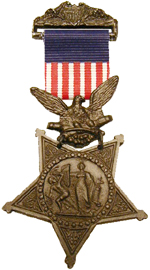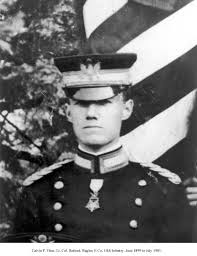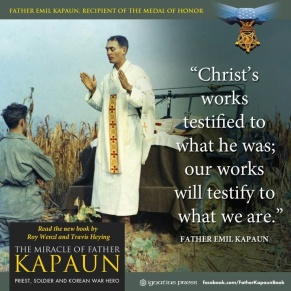As General in the American Revolution, George Washington once wrote that the “road to glory in a patriot army and a free country is…open to all”. European armies of the time bestowed honors, only on high-ranking officers who had achieved victory in battle.
There was no such honor for the common soldier.
The American military of the colonial era had precedent for such an award, but only under limited circumstances. Congressional medals were awarded to Washington himself on March 25, 1776, following the British evacuation of Boston, to General Horatio Gates in November 1777 in recognition of his victory over British General John Burgoyne at Saratoga, and to Major-General “Light-Horse Harry” Lee, father of Civil War-era Confederate general Robert E. Lee, in recognition of his 1779 attack on the British position at Paulus Hook, New Jersey.

A “Fidelity Medallion” was awarded to three militia men in 1780, for the capture of John André, the British officer and spy whose capture uncovered the treachery of General Benedict Arnold.
The future 1st President’s general orders of August 7, 1782 established a “Badge of Military Merit” to recognize those members of the Continental Army who performed “any singular meritorious action”.
In time, General Washington’s Badge of Military Merit morphed into what we now know as the Purple Heart, but the precedent had been set. This was the first such honor available to any United States military service member, who had distinguished himself by act of valor.
Around the time of the Mexican-American war (1846 – ’48), Congress created the “Meritorious Service Citation Certificate”, a recognition for “any private soldier who had distinguished himself by gallantry performed in the presence of the enemy”. The award came in and out of use in the following decades, later becoming the Distinguished Service Medal, an award available to United States and foreign military service personnel and, in limited circumstances, civilians.
 In the early days of the Civil War, General-in-chief of the army Winfield Scott argued against such an award, claiming it to be “too European”.
In the early days of the Civil War, General-in-chief of the army Winfield Scott argued against such an award, claiming it to be “too European”.
Secretary of the Navy Gideon Welles adopted the idea on behalf of the Navy, following Scott’s retirement in October 1861. President Abraham Lincoln signed “Public Resolution #82” on December 21, 1861, creating a Navy medal of honor.
An Army version of the medal was created the following July, first awarded to six Union soldiers for hijacking the Confederate locomotive, “The General”. Several were caught and hanged as Union spies including leader of the raid, James Andrews. He alone was Not awarded the Medal of Honor, as he was a civilian.
Medals of Honor are not awarded casually, reserved only for the bravest of the brave, and for well-documented acts of valor. Permit me to share a few examples, each from his own moment in history.
Few soldiers on the Civil War battlefield had a quicker route to death’s door, than the color bearer. National and regimental flags were all-important sources of inspiration and communication.

Reverend W. Jamison Thomson of Hartford, CT described the importance of the battle flag: “It represents the cause, is the rallying point, while it is aloft proclaims that victory is still intended, is the center of all eyes, is the means of communication between soldiers, officers, and nation,” he said, “and after the engagement, and after many of them, is their marked memento so long as its identity can be preserved.”
William Harvey Carney was born a slave in Norfolk Virginia, in 1840. How the man made it to freedom is uncertain but, in 1863, Carney joined the Massachusetts 54th Infantry, with the rank of Sergeant.
During the ill-fated assault on Fort Wagner of July 1863, Carney took up the Regimental Color as the color guard fell, mortally wounded. Carney continued all the way to the parapet despite multiple serious wounds and struggled back across the battlefield, as the 54th retired under intense fire. At last handing the colors over to another survivor, Carney said “Boys, I only did my duty; the old flag never touched the ground!”

Sergeant Carney’s heroism of July 1863 was the earliest such action to result in a Medal of Honor given to an American of African Ancestry, though the medal itself was not awarded until 1900.
During the Boxer Rebellion of 1900, Chaplain’s assistant and regimental musician Calvin Pearl Titus of Vinton, Iowa volunteered to scale the 30-ft walls of Peking, raising the American flag over the outer walls of the city.
President Theodore Roosevelt awarded Titus the medal of Honor, for “Gallant and daring conduct in the presence of his colonel and other officers…”
President Roosevelt would one day become the only President awarded the Medal of Honor for actions performed on July 1, 1898, in Cuba. Titus himself is now remembered as the last American standard-bearer.
 On October 8, 1918, Tennessee native Corporal Alvin Cullum York of the 82nd Division lead a group of seventeen against a numerically superior German force, dug in at Chatel-Chehery, France.
On October 8, 1918, Tennessee native Corporal Alvin Cullum York of the 82nd Division lead a group of seventeen against a numerically superior German force, dug in at Chatel-Chehery, France.
Let his citation tell the story: “…After his platoon had suffered heavy casualties and three other non-commissioned officers had become casualties, Cpl. York assumed command. Fearlessly leading seven men, he charged with great daring toward a machine gun nest, which was pouring deadly and incessant fire upon his platoon. In this heroic feat the machine gun nest was taken, together with four officers and 128 men and several guns.”
 Kingston Texas 2nd Lieutenant Audie Murphy found himself senior officer of a company of 18, whittled down from 235 by disease, wounds and casualties.
Kingston Texas 2nd Lieutenant Audie Murphy found himself senior officer of a company of 18, whittled down from 235 by disease, wounds and casualties.
On January 26, 1945, Murphy’s small force found itself under assault by six German tanks and a large infantry force.
A man the Marine Corps had once turned down for being too small, Murphy climbed aboard a burning tank destroyer. Out in the open and exposed to German fire from three sides, the 19-year old single-handedly fought off the entire assault, killing or wounding fifty and causing the German tanks to withdraw.
 Chaplain Emil Kapaun, the “Shepherd in Combat Boots” selflessly sacrificed himself on behalf of fellow prisoners in 1951, in the frozen hell of a North Korean prison camp.
Chaplain Emil Kapaun, the “Shepherd in Combat Boots” selflessly sacrificed himself on behalf of fellow prisoners in 1951, in the frozen hell of a North Korean prison camp.
President Barack Obama awarded Kapaun’s family the Medal of Honor during a ceremony in the east wing of the White House, on April 11, 2013.
Father Kapaun’s body lies in an unmarked mass grave, somewhere in Pyoktong county.
PFC Sammy Lee Davis distinguished himself during the small hours of November 18, 1967, when the 4th Artillery of 9th Infantry Division came under heavy attack west of Cai Lay, Republic of Vietnam.
Repeatedly knocked to the ground by enemy mortar fire and suffering multiple injuries, the Cannoneer from Dayton, Ohio fought back first with a heavily damaged, flaming howitzer, then with recoilless rifle and finally, a machine gun.
That’s his picture, at the top of this page.
Two Medals of honor were awarded posthumously, to Delta Force snipers Gary Gordon and Randy Shugart, for their hopeless defense of the crash site of a downed UH-60 Blackhawk helicopter against hundreds of fighters loyal to the Somali warlord Mohamed Farrah Aidid.
 Corporal Jason Lee Dunham of Scio New York deliberately threw himself on an Iraqi grenade on April 14, 2004, saving the lives of fellow Marines at the sacrifice of his own life.
Corporal Jason Lee Dunham of Scio New York deliberately threw himself on an Iraqi grenade on April 14, 2004, saving the lives of fellow Marines at the sacrifice of his own life.
John 15:13 of the King James Bible teaches us: “Greater love hath no man than this, that a man lay down his life for his friends”.
Corporal Dunham was twenty-two years old.
Sergeant 1st class Jared Monti of Abington Massachusetts was killed in the mountains of Nuristan Province in Afghanistan, while attempting to rescue a wounded soldier from a hail of small arms and rocket-propelled grenade fire.
Sgt. Monti was the sixth person from the wars in Iraq and Afghanistan, to be awarded the Medal of Honor.
The Lee Brice song “I Drive your Truck“, voted Song of the Year at the 49th annual Academy of Country Music Awards, is his story.
The nation’s highest medal for military valor has been awarded 3,525 times since its inception in 1861, to 3,506 individual recipients. 624 were awarded posthumously. Nineteen men have received the Medal of Honor, twice.
Doctor Mary Edwards Walker received the Medal of Honor on November 11, 1865. The Army changed eligibility criteria in 1917 and revoked 911 such awards given to non-combatants, including Dr. Walker. Fifty years later, an Army board restored Walker’s Medal of Honor, praising her “distinguished gallantry, self-sacrifice, patriotism, dedication and unflinching loyalty to her country, despite the apparent discrimination because of her sex.” She is the only female so honored and only the second woman in American history, licensed as a Medical Doctor. The youngest Medal of Honor recipient was 11-year old drummer boy, Willie Johnston.
The youngest Medal of Honor recipient was 11-year old drummer boy, Willie Johnston.
Possibly without exception, every one will tell you they are not heroes. They were doing a job and those who gave their lives, are the Real heroes.
If that’s not the very definition of heroism, I’m at a loss to understand what might be.

Fun Fact: Just last month, the Animals in War & Peace Medal of Bravery was instituted in the Unites States, to recognize the extraordinary contributions of animals in times of war and peace. Patterned after the Dickin Medal awarded in the United Kingdom, recipients include Cher Ami, a pigeon who served with the US Signal Corps in WW1, Chips, a Military Working Dog (MWD) who served in WW2 and Sergeant Reckless, the Mongolian Mare who served with the United Sates Marine Corps, during the Korean conflict.



Stories about the actions and achievements of brave people are always humbling. I confess I find the practice of giving medals to animals bewilderingly pointless, unless someone can tell me that the wonderful creatures that work for us are actually aware of the awards they receive, and why.
LikeLiked by 1 person
As one admittedly soft in the head and the heart when it comes to our furry woodland creatures Mike, I must admit. What you say is correct. It would seem such awards are more for ourselves than they are for the recipient. Particularly as the three critters aforementioned, have long passed from this mortal coil.
LikeLike
Reblogged this on Dave Loves History.
LikeLiked by 1 person
Thanks Dave.
LikeLiked by 1 person
Heroism: same as valor, using intelligence and courage to _defeat_ the enemy.
LikeLiked by 1 person
I like Patton, and when it comes purple hearts, far better to let the other sacrificial victim get shot or stabbed for HIS country.
LikeLiked by 1 person